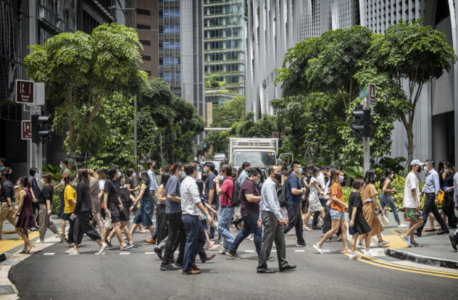Some firms encourage remote work to reduce in-office infections, while others continue with minimal precautions.
SINGAPORE: As Singapore grapples with a new wave of COVID-19 infections, several companies have adopted additional measures to protect their staff, including encouraging employees to work from home.
Public relations firm Tate Anzur, for example, implemented a “health reset” last week, urging its employees to work remotely through the end of April after a surge in illnesses among its staff. Nearly half of its employees—21 out of 50—took medical leave over the past month, with four testing positive for COVID-19. To minimize the spread of the virus, the company decided to extend its work-from-home policy instead of following the earlier practice of having staff return to the office two days a week.
“We hope that by all doing our part, we can maintain a healthy and energized team, despite the rise in cases,” said Yvonne Li, the company’s founder and managing director.
Health Minister Ong Ye Kung reported on April 14 that daily infections in Singapore had risen from around 1,400 in March to approximately 4,000 a day. However, he noted that the situation had “stabilised” in recent days. The Ministry of Health (MOH) stated that between April 2 and April 8, there were 16,018 cases, down from the previous week’s tally of 28,410. Since the country entered the endemic phase, COVID-19 numbers have been updated weekly.
Other businesses, like tourist attraction Madame Tussauds Singapore, which allows non-customer-facing employees to work from home, have also implemented measures to curb the spread of illness. Sylvia Tan, the attraction’s head of commercial operations, reported an average of two to four staff members from its customer-facing team on medical leave each week. Although there have been no reported COVID-19 cases recently, Tan noted that common colds have been circulating widely among the staff.
“We are cautious because our workforce is very lean, and we can’t afford for half the team to be absent,” said Tan. The company has been distributing COVID-19 test kits for staff to use if they feel unwell. Employees testing positive are sent home immediately, and their close contacts are tested as well.
Not all companies are tightening their measures. Minor Group, which operates F&B brands such as Thai Express and Poulet, stated that it hasn’t made additional precautions since Singapore lowered its disease alert level in February. The company’s CEO, Dellen Soh, explained that employees are no longer required to report COVID-19 cases to the company, as the illness is now regarded like any other flu. Soh noted that, despite the lack of additional measures, they haven’t seen a surge in employees taking sick leave, although some workers might be reluctant to do so due to concerns about job security amid uncertain economic conditions.
Stay at Home if Unwell
Health experts have stressed the importance of continuing to practice good public health, even as immunity levels in the population fluctuate. Professor Paul Tambyah, president of the International Society for Infectious Diseases, highlighted the dangers of presenteeism, where employees attend work despite feeling sick, stating it was a long-standing public health issue, even before the pandemic.
“Companies don’t need additional precautions; they just need to encourage good hygiene and ensure employees don’t work while sick,” said Prof Tambyah.
Associate Professor Alex Cook, vice dean of research at NUS’ Saw Swee Hock School of Public Health, echoed the importance of allowing sick employees to work from home, not just for COVID-19, but for other illnesses like influenza as well. He advised that mask-wearing should be encouraged for symptomatic employees, even if they test negative for COVID-19.
Prof Dale Fisher from NUS’ Yong Loo Lin School of Medicine suggested that companies redesign their work rosters and infrastructure to minimize crowding and ensure better ventilation in the workplace. “We need to act sustainably now,” he said, stressing that the current situation requires more practical and sustainable actions to keep staff healthy.








